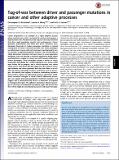Tug-of-war between driver and passenger mutations in cancer and other adaptive processes
Author(s)
McFarland, Christopher D.; Mirny, Leonid A.; Korolev, Kirill Sergeevich
DownloadMcFarland-2014-Tug-of-war between d.pdf (1.146Mb)
PUBLISHER_POLICY
Publisher Policy
Article is made available in accordance with the publisher's policy and may be subject to US copyright law. Please refer to the publisher's site for terms of use.
Terms of use
Metadata
Show full item recordAbstract
Cancer progression is an example of a rapid adaptive process where evolving new traits is essential for survival and requires a high mutation rate. Precancerous cells acquire a few key mutations that drive rapid population growth and carcinogenesis. Cancer genomics demonstrates that these few driver mutations occur alongside thousands of random passenger mutations—a natural consequence of cancer’s elevated mutation rate. Some passengers are deleterious to cancer cells, yet have been largely ignored in cancer research. In population genetics, however, the accumulation of mildly deleterious mutations has been shown to cause population meltdown. Here we develop a stochastic population model where beneficial drivers engage in a tug-of-war with frequent mildly deleterious passengers. These passengers present a barrier to cancer progression describable by a critical population size, below which most lesions fail to progress, and a critical mutation rate, above which cancers melt down. We find support for this model in cancer age–incidence and cancer genomics data that also allow us to estimate the fitness advantage of drivers and fitness costs of passengers. We identify two regimes of adaptive evolutionary dynamics and use these regimes to understand successes and failures of different treatment strategies. A tumor’s load of deleterious passengers can explain previously paradoxical treatment outcomes and suggest that it could potentially serve as a biomarker of response to mutagenic therapies. The collective deleterious effect of passengers is currently an unexploited therapeutic target. We discuss how their effects might be exacerbated by current and future therapies.
Date issued
2014-10Department
Institute for Medical Engineering and Science; Massachusetts Institute of Technology. Department of Physics; Massachusetts Institute of Technology. School of EngineeringJournal
Proceedings of the National Academy of Sciences of the United States of America
Publisher
National Academy of Sciences (U.S.)
Citation
McFarland, Christopher D., Leonid A. Mirny, and Kirill S. Korolev. “Tug-of-War Between Driver and Passenger Mutations in Cancer and Other Adaptive Processes.” Proceedings of the National Academy of Sciences 111, no. 42 (October 2, 2014): 15138–15143.
Version: Final published version
ISSN
0027-8424
1091-6490